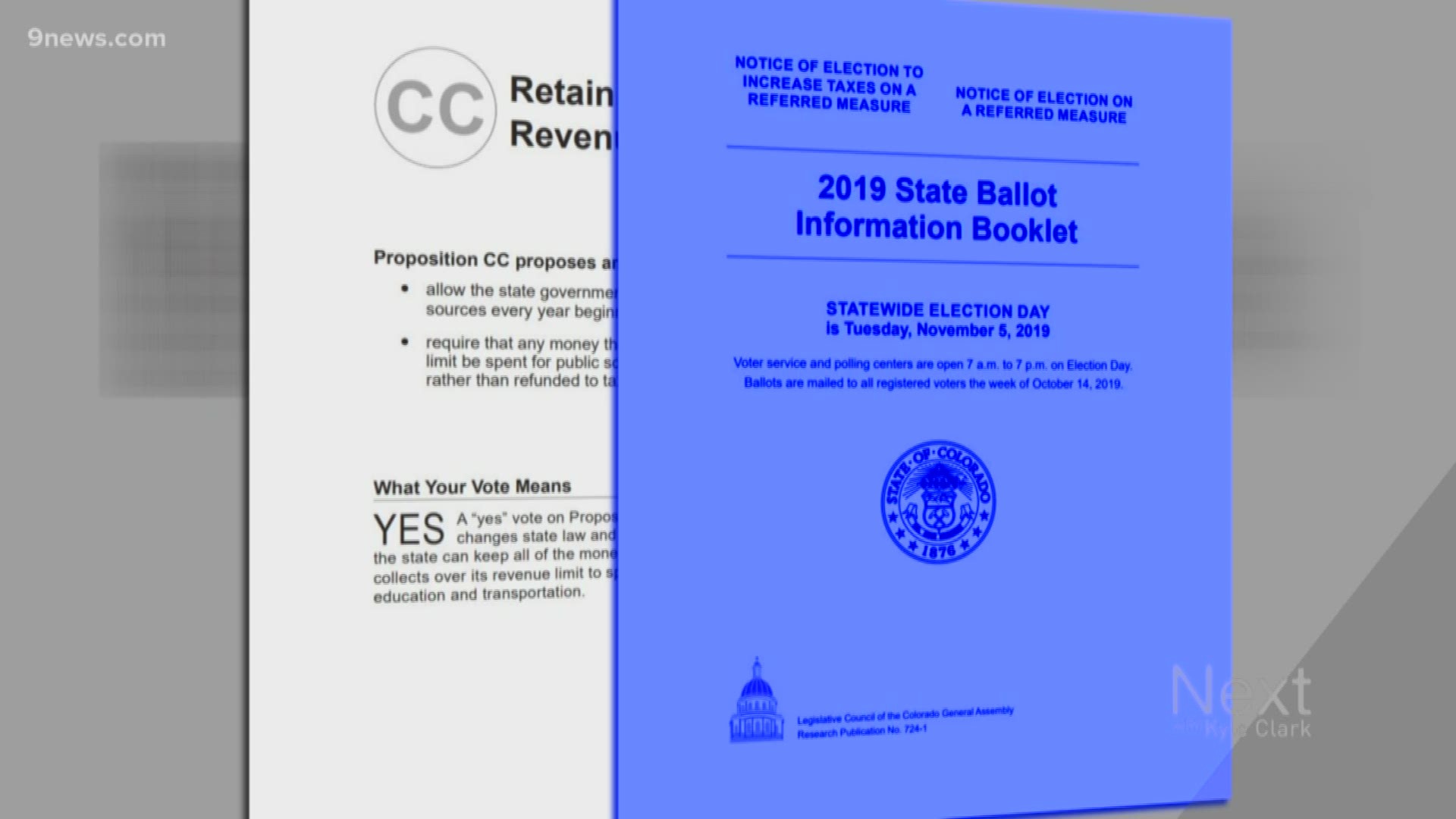DENVER — You know how you know the summer's over?
All those different colors you start to see.
No, not the leaves. That hasn't fully happened yet, but the color blue is showing up in your mailbox.
Colorado just sent out 2.1 million Blue Books to detail the two ballot issues that will appear on the November ballot for all voters statewide. And even though the Blue Books are fresh off the printing press, the information for one of the two ballot issues is already outdated.
First, here are the two ballot issues every voter in Colorado who get to decide:
Proposition CC - Statewide TABOR override, allowing state to keep TABOR refunds
A "Yes" vote allows the state to keep revenue above the current limit instead of issuing TABOR refunds on years when the state collects too much. The money from CC would be spent on schools and roads. At least, initially. Because this is a proposition, it only changes state statute and future lawmakers can change state statutes without a vote of the people.
A "No" vote keeps the current structure in place where the state would have to issue TABOR refunds for revenue above and beyond the required limit.
Proposition DD - Legalize and Tax Sports Betting to Fund Colorado's Water Fund
A "Yes" vote legalizes and taxes sports betting at 10 percent of the casinos' net sports betting proceeds. The money generated from the tax would fund water projects in the state.
A "No" vote keeps sports betting illegal in Colorado and does not create a new sports betting tax for Colorado's Water Fund.
If statewide voters approve sports betting, using an app to make sports bets would be legal. Residents of Colorado's gaming towns, Blackhawk, Central City, and Cripple Creek, would also be asked to vote on a separate issue allowing casinos to offer sports betting in person. If approved, sports betting could happen at casinos.
It's the Blue Book information about Proposition CC that already needs to be updated.
It details how a "yes" vote on CC would allow the state to keep an estimated $310 million in revenue from 2019-20 that it would otherwise have to refund, and $342 million in revenue from 2020-21.
Those estimates were based on the June forecast ahead of the start of Colorado's 2019-20 fiscal year. In other words, it wasn't based on any real data of money received yet. On Sept. 20, the state's legislative council staff chief economist completed the quarterly budget forecast, which showed a drop in those estimates.
Now, the state is projected to have $264.3 million in extra revenue in 2019-20 and $142.9 in 2020-21. Together, that's $407 million, down from $652 million from the June estimates.
It's a moving target. No different than a salesperson trying to budget their personal life ahead of finding out if they were more successful or fell short on their sales that year.
The budget forecast could also increase again as money is actually received by the state. The last quarter, when tax returns are filed, is when the state sees most of the money and knows if the projections were met or fell short.
But why, if the budget forecast changed last week, did the state send out the Blue Books with outdated information?
The state Constitution.
The Blue Book is required to be mailed more than 30 days before an election. The election in on Nov. 5. Legislative Council is responsible for sending out the Blue Books. According to Natalie Mullis, the Director of Legislative Council, the information was sent to the printers on Sept. 11, so they could be completed and mailed in time to meet the Constitutional deadline.
Even though the Blue Book appears online, it won't be updated with the September forecast dollar amounts, so voters won't have conflicting information.
According to Kate Watkins, the Chief Economist for the Legislative Council, a good margin of error for estimating future state budgets is between one and three percent. With a $15 billion state budget, one percent would be $150 million and three percent would be $450 million. That means the $250 million discrepancy between the June and September figures for 2019-20 and 2020-21 are within the expected margin of error.
And speaking of the Blue Book, Denver decided to go green during the last election and skip paper copies of the election guide, unless voters specifically requested one. The city's new clerk and recorder, Paul Lopez, plans to return to the old way of doing business and will print Blue Books. The state also requires them for elections with debt and tax measures.
SUGGESTED VIDEOS: Next with Kyle Clark

